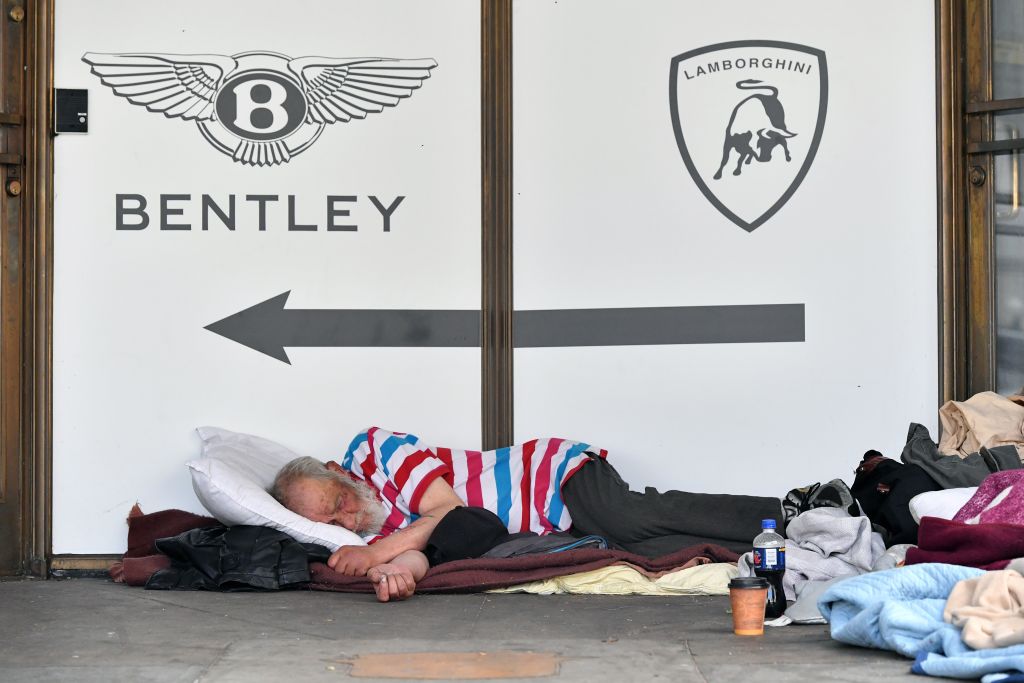Making sense of America's commercial real estate crisis
Could the uptick in office vacancies trigger a recession?


A free daily email with the biggest news stories of the day – and the best features from TheWeek.com
You are now subscribed
Your newsletter sign-up was successful
More Americans have chosen to work from home full-time or part-time since the start of the Covid-19 pandemic, reducing the need for some firms and organizations to pay for commercial office space. In some cities, downtowns have seen an increase in vacant buildings and shuttered restaurants, while rapid transit systems remain well below pre-pandemic levels of ridership in the biggest metropolitan areas. The problem is not confined to cities; suburban and exurban office parks are also in trouble. But experts disagree on how big of a threat a downturn in the commercial real estate market represents to the broader economy.
What's happening with commercial real estate?
The national office vacancy rate reached 12.9% in April 2023 — a huge jump from the 9.4% at the end of 2019 — with significant year-over-year increases in nearly every market. That trend held for big cities in both blue and red states. Empty offices are a nightmare for commercial real estate owners and the institutions who staked them, threatening a potential wave of defaults and bank failures that could have ripple effects throughout the economy.
A decrease in office workers can tank the many businesses that depend on them, including lunch spots and convenience stores, and put a hole in municipal budgets, which rely on commercial real estate taxes for a significant portion of revenue. Especially given the rapid collapse of Silicon Valley Bank, Signature Bank, and First Republic Bank earlier this year, anxiety is rising in some corners about a repeat of 2008, when a wave of mortgage defaults could not be contained to the housing sector and plunged the economy into its worst crisis since the Great Depression.
The Week
Escape your echo chamber. Get the facts behind the news, plus analysis from multiple perspectives.

Sign up for The Week's Free Newsletters
From our morning news briefing to a weekly Good News Newsletter, get the best of The Week delivered directly to your inbox.
From our morning news briefing to a weekly Good News Newsletter, get the best of The Week delivered directly to your inbox.
Is a crisis looming?
Experts are divided. Commercial real estate is a $20 trillion sector. Small and regional banks hold 80% of the debt and may not be well-positioned to ride out a crisis. Morgan Stanley Chief Financial Officer Lisa Shallett warned in April that commercial real estate prices could plummet as much as 40%. "More than half of the $2.9 trillion in commercial mortgages will be up for refinancing in the next couple of years," meaning that borrowers will have to adjust suddenly to higher interest rates. The commercial real estate market "has all but collapsed," economist Philip Pilkington said at Newsweek. Those loans will "turn into toxic waste and end up sealed away on the government's balance sheet," possibly triggering a recession as a combination of higher interest rates and inflation compound the economy's woes.
On the other hand, "it's safe to say the most glaring market excesses were corrected in 2022 and aren't hanging over us now," Howard Marks of investment firm Oak Tree Capital said in an April memo. Yes, "defaults on office building mortgages and other CRE loans are highly likely to occur," but most banks will be able to withstand the losses, and renegotiation between lenders and borrowers could also help alleviate the pressure on the economy. While there is likely to be some turmoil in the commercial real estate market in the days ahead, "I believe the risk is overblown" in terms of the threat to the broader economy, said Brad Thomas of Wide Moat Research.
What's next?
If the commercial real estate sector's troubles are being driven by work-from-home policies, could it be alleviated by a shift back toward office work? Prominent tech companies like Google and Salesforce are trying either to compel or lure workers back to offices, in some cases walking back remote work policies put in place during the pandemic and "igniting tensions with staff in the process," wrote Catherine Thorbecke at CNN. It is also possible that federal and state governments will compel more workers to return to the office, leaving those looking for permanent remote work with fewer options.
That matches a general trend in the economy, which saw a significant decrease in private sector companies offering remote work policies from 2021 to 2022. According to the Bureau of Labor Statistics, the share of firms with no employees teleworking went from 60.1% in the third quarter of 2021 to 72.5% during the same time period in 2022. "There was remote work before the pandemic, and a little more after the pandemic," wrote journalist Kevin Drum.
A free daily email with the biggest news stories of the day – and the best features from TheWeek.com
But a total revolution in how we work is probably not on the horizon for most. The question is why office vacancies remain higher than remote working numbers would suggest, and whether a slow return to in-person work for most people will square the circle. Even in the best case scenarios, however, some office buildings will need to be razed or repurposed for residential use.
David Faris is a professor of political science at Roosevelt University and the author of "It's Time to Fight Dirty: How Democrats Can Build a Lasting Majority in American Politics." He's a frequent contributor to Newsweek and Slate, and his work has appeared in The Washington Post, The New Republic and The Nation, among others.
-
 ‘My donation felt like a rejection of the day’s politics’
‘My donation felt like a rejection of the day’s politics’Instant Opinion Opinion, comment and editorials of the day
-
 Trump wants a weaker dollar but economists aren’t so sure
Trump wants a weaker dollar but economists aren’t so sureTalking Points A weaker dollar can make imports more expensive but also boost gold
-
 Political cartoons for February 3
Political cartoons for February 3Cartoons Tuesday’s political cartoons include empty seats, the worst of the worst of bunnies, and more
-
 The rise of the world's first trillionaire
The rise of the world's first trillionairein depth When will it happen, and who will it be?
-
 The surge in child labor
The surge in child laborThe Explainer A growing number of companies in the U.S. are illegally hiring children — and putting them to work in dangerous jobs.
-
 Your new car may be a 'privacy nightmare on wheels'
Your new car may be a 'privacy nightmare on wheels'Speed Read New cars come with helpful bells and whistles, but also cameras, microphones and sensors that are reporting on everything you do
-
 Empty office buildings are blank slates to improve cities
Empty office buildings are blank slates to improve citiesSpeed Read The pandemic kept people home and now city buildings are vacant
-
 Why auto workers are on the brink of striking
Why auto workers are on the brink of strikingSpeed Read As the industry transitions to EVs, union workers ask for a pay raise and a shorter workweek
-
 American wealth disparity by the numbers
American wealth disparity by the numbersThe Explainer The gap between rich and poor continues to widen in the United States
-
 Cheap cars get run off the road
Cheap cars get run off the roadSpeed Read Why automakers are shedding small cars for SUVs, and what that means for buyers
-
 Vietnamese EV maker VinFast wows with staggering Nasdaq debut
Vietnamese EV maker VinFast wows with staggering Nasdaq debutSpeed Read Can the company keep up the pace, or is it running out of gas?
